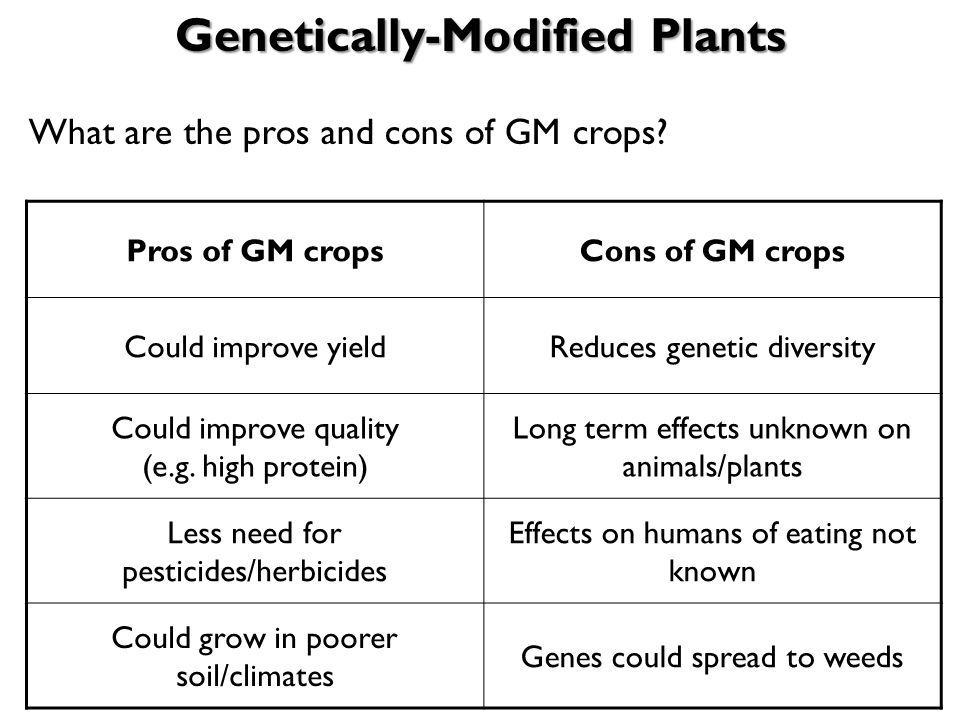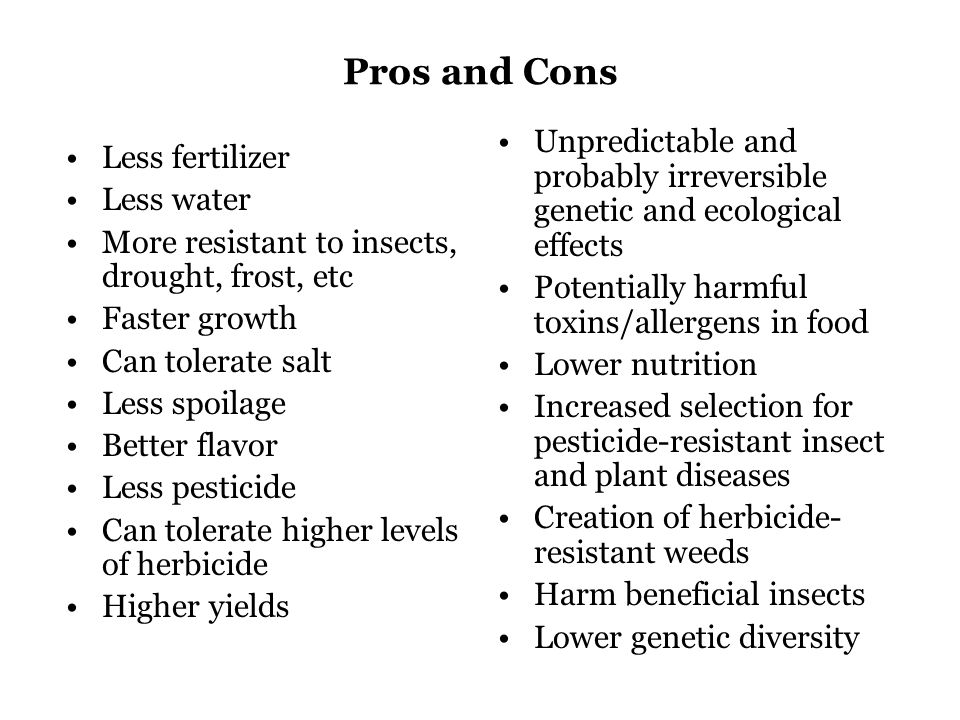Tweaking a gene or two can bring the desired changes in human body but the technique brings along several moral and ethical issues.
The Pros and Cons of Genetic Engineering in Environmental Science and Sustainability. Genetic engineering is a new and controversial process. With its medicinal, therapeutic, and agricultural applications, many scientists view it as a scientific beacon leading to a new era of discovery and solutions. However, others view the novelty of genetic. ‘Genetic engineering’ is the process to alter the structure and nature of genes in human beings, animals or foods using techniques like molecular cloning and transformation. In other words, it is. For this reason, the pros and cons of gene editing are being debated, and it’s not yet clear whether or not the potential good of modifying DNA outweighs the potential hazards. Assuming thorough testing, safe application, and observations taken for generations, the potential good that could come from being able to edit human embryos would. One of the main benefits of genetic engineering is that it can help cure diseases and illnesses in unborn children. All children would be able to be born healthy and strong, with no diseases or illnesses present at birth. Genetic engineering can also be used to help people who risk passing on terribly degenerative diseases to their children. All that we are is theresult of what we have thought Buddha For what shall itprofit a man, if he shall gain the whole world andlose his own soul? The Bible Introduction.
You will have a perfect face if that stub of a nose you got from your father is sharpened a bit. Susceptibility to seasonal allergies is another issue that hassles you day in and day out. We all have something which needs to be altered and made perfect. Developments in science may make such modifications a reality through the use of genetic engineering.
However, the technology is still inviting lots of debates and controversies related to its optimum use. Here we discuss the pros and cons of genetic engineering.
Genetic engineering means alteration of your gene structure to replace any dysfunctional gene with a more efficient one. For instance, if somebody is suffering from cancer, his mutated genes can be replaced with healthy ones through genetic engineering. Another use can be to prevent any family disorder from passing on to a child through gene alteration.

Genetic engineering can either happen through intervention in the sperm and egg cells or via introduction of a viral vector carrying the healthy gene into the body of a person. Not many people know that one of the first uses of genetic engineering was for production of synthetic insulin which has proved to be a great boon for diabetics.
Pros of Genetic Engineering
As explained above, there are several reasons why genetic engineering can work wonders for the human race. Though we have progressed a lot from the times when smallpox, chickenpox and plague used to wipe out entire cities, new and more lethal diseases like cancer, AIDS, cardiac ailments and Alzheimer’s are still a challenge.
Auto immune diseases are another set of disorders which are troubling several people around the world and are still a mystery for scientists. With genetic engineering, we can hope to weed out these diseases from their roots which means replacing the faulty genes that allow them to exist and flourish in our bodies. Development of medicines specific to genetic makeup of each individual to get the best results can be one of the pros of genetic engineering.
Not only the diseased and hapless but even healthy and sound can look forward to reap benefits of the technique. Scientists are talking about longer lifespans since the ageing process can be stopped by tweaking particular genes. In fact, not only life spans but complete reversal of time – from old age to childhood or youth – may become a reality.
[ad#co-1]
Cons of Genetic Engineering

Though benefits of genetic engineering may seem like our ultimate dreams coming true, it is not so easy. There are various risks as well as moral and ethical dilemmas associated with the technique right now. Scientists are still experimenting with genetic engineering and some of these attempts have resulted in death of the subjects because there is still no clarity on how and in what way the healthy genes can be introduced in a body. In addition, the risks of making such an alteration are also not known. There can be an inherent capacity in human body to resist any attempt for genetic makeover by making corresponding changes in the genes elsewhere.
The risk of creating a seemingly perfect race is also manifold. Due to diversity of genes, there are some people who are more prone to a certain disease while there are others who are completely resistant to it. Since with the ‘perfect gene’ theory, we will all be genetically same, a new and more lethal disease can finish off the whole human population in one go.
On the other hand, if there are only a few who get this benefit of having a perfect gene, there will be discrimination. A few “mentally and physically perfect” people ruling large number of lesser mortals can be one of the cons of genetic engineering.
Parents will start making a beeline to have a “designer baby” who can bend it like Beckham and sing it like Bryan Adams while having the looks of Tom Cruise.
So is it really necessary for scientists to play God and change the genetic character of people to make them healthy or increase their life spans? Maybe with time and greater knowledge, we get to understand things better. Moral and ethical issues aside, genetic engineering holds a great scope in medical field and restricting the use of this technology only to deal with chronic and deadly diseases can be the solution which helps us all.
[ad#afterpost]
Pros And Cons Of Genetic Engineering In Humans
GENETIC ENGINEERING:
Genetic engineering is the direct manipulation of a gene of an organism by using bio-technology. This technology is used to change the genetic make-up of cells. New segment or strands of DNA is obtained by either synthesizing DNA in the labs or isolating and copying the required genetic material using recombinant DNA methods.
It is a perfect example where two sciences from different realms namely- biology and engineering merge together to help solve the upcoming problems of this era. It has a plethora of top-notch applications in agriculture, medical sciences, technology and scientific research.

4 STEPS INVOLVED IN GENETIC ENGINEERING:
- DNA Extraction
- Gene cloning and designing
- Transformation
- Backcross Breeding

PROS OF GENETIC ENGINEERING:
- One of the greatest achievements of mankind was the production of artificial insulin. Yes, you heard it right! The first insulin production can be credited to genetic engineering which helped scientists to produce insulin from yeast and E-coli.
- The sudden boom in the field of agriculture to feed the growing population is also a gift of genetic engineering. In 1994, the first genetically synthesized foods were made which became an instant hit. This has helped humans to synthesize hybrid superior quality of seeds artificially.
- The role of genetic engineering has been immense to improve the nutrition value, growth pattern and resilience ability in plants like rice, wheat, potato and tomato. These crops are less likely to be infected from those notorious plant pests.
- Sheep can produce milk which contains therapeutic protein which is believed to cure cystic fibrosis in humans. Thanks to genetic engineering!
- The nematode worms- C. elegans has only a few hundred of cells in its nervous tissue which can provide a substrate to study Alzhimer disease.
- Gene transfer by the help of the viral vectors has been proposed as a means of controlling the invasive species and vaccinating the animals [fauna] from any sort of disease.
- Some organisms can be 'tailor made' with the specific characteristic of absorbing more of carbon dioxide and hence reducing the global warming which is indeed a grave issue human civilization is facing at the present times.
CONS OF GENETIC ENGINEERING:
- Some people are of the notion that it is not right to interfere with nature in our own ways. Who knows it may do us more harm than good.
- Transfer of selected genes from one species to another may lead to the loss in variety. Nature's survival of the fittest will also be harmed. The power of self evolving might be lost which seems potentially more harmful.
- GM crops are more expensive than regular crops and cannot be afforded by the common man of a developing nation.
- It has been found out that some GM crops cause specific allergy to certain people. Pollens in this plants are usually harmful which may harm the insects pollinating them.
Pros And Cons Of Genetic Engineering
Genetic engineering is a breakthrough in human progress which might help us to find the solutions of the questions which pose a grave threat to humanity.